Legacy Business Programs: Strategies, Challenges, and Success Stories
Join us for an insightful and comprehensive exploration of Legacy Business Programs, designed to support and preserve businesses with deep-rooted significance in their communities.
This program offers a deep dive into the value of Legacy Businesses, examines successful program models from across the state, and provides actionable suggestions for developing effective Legacy Business Programs.
Who Should Attend:
This program is ideal for community planners, local government officials, business owners, and anyone interested in preserving and supporting Legacy Businesses. Whether you're looking to start a Legacy Business program or seeking ways to enhance an existing one, this event offers valuable insights and practical strategies.
You will be able to...
- Gain a comprehensive understanding of what defines a Legacy Business, its importance to community vitality, and the specific challenges these businesses face.
- Grasp key components and methodologies of effective Legacy Business Programs, including successful strategies and common themes observed in domestic and international examples.
- Acquire practical knowledge on how to create and implement a Legacy Business program, including actionable steps, tools, and components necessary for program development and execution.
- Evaluate real-world case studies of Legacy Business Programs from various cities to identify effective practices, common challenges, and strategies for successful program enactment and management.
Topics:
The Importance of Legacy Businesses and Legacy Business Programs
Explore what defines a Legacy Business and its crucial role in community vitality. Learn about the unique challenges faced by these businesses and get an introduction to Legacy Business Programs designed to support them.
Basics of Legacy Business Programs
Delve into the significance of Legacy Business Programs, drawing on examples from various Programs. Discover common themes, challenges, and successful strategies that have emerged from these Programs.
How to Create a Legacy Business Program
Receive practical advice on developing your own Legacy Business program. Learn about actionable steps for planners, the Legacy Business Methodology, and the four key components of effective Programs. Explore how different Programs implement these components.
Case Studies of Legacy Business Programs Across the State
Explore real-world examples of successful Legacy Business Programs from cities across the state such as San Francisco, Pasadena, Long Beach, and Los Angeles. Review the tools and components used in each case, including marketing, financial assistance, technical support, and legislative strategies. Understand the pathways to program enactment and identify key similarities and differences among the case studies.
Panel/Roundtable Discussion
Experience a roundtable discussion with Program organizers and managers sharing their experiences, strategies and practical advice learned from their own Legacy Business Programs. Topics will include the effectiveness of various program components, interaction with local non-profits, and strategies for overcoming common obstacles.
Audience Q&A
Participate in an interactive Q&A session where you can pose questions to the speakers and panelists.
Speakers
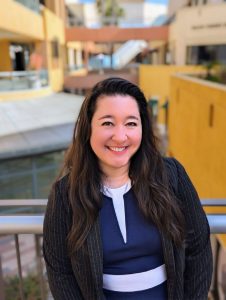 Nyssa Buck, City of Los Angeles.
Nyssa Buck, City of Los Angeles.
Nyssa Buck is a Senior Management Analyst at the City of Los Angeles Economic and Workforce Development Department. She oversees various economic development programs, including incubators, healthy market conversion, and Good Food Zones. Through the newly launched Legacy Business Program, Nyssa focuses on preserving and supporting long-standing businesses integral to the community's cultural and economic fabric. She works closely with businesses and local community organizations to develop strategies that ensure the sustainability and growth of these establishments.
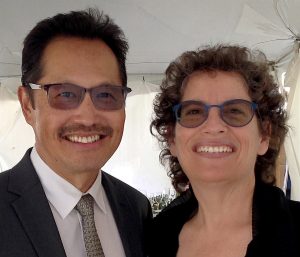 Lee Fukui and Mauna Eichner, Long Beach Heritage.
Lee Fukui and Mauna Eichner, Long Beach Heritage.
Mauna Eichner and Lee Fukui are members of Long Beach Heritage’s Advocacy Committee and founding members of the Legacy Business Program Subcommittee, which formed in 2018. They are responsible for the operations of the program for Long Beach Heritage, including creating the graphics, outreach, updating the website with new businesses, and coordinating presentations.
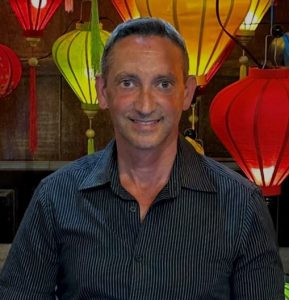 Richard Kurylo, Legacy Business Program Manager, City and County of San Francisco
Richard Kurylo, Legacy Business Program Manager, City and County of San Francisco
Richard Kurylo is the Legacy Business Program Manager in the San Francisco Office of Small Business, which is a division of the Office of Economic and Workforce Development in the City and County of San Francisco. Mr. Kurylo has been the program manager since 2016, shortly after the Legacy Business Program was established in 2015. The role involves program development, overseeing a budget exceeding $1 million annually, processing new Legacy Business Registry applications, marketing and promotions, providing business assistance, managing grants, writing legislation, and more. Through his 16+ years with the City and County of San Francisco, Mr. Kurylo has gained experience in neighborhood revitalization, business engagement, policy development, contracts, and budgets. Prior to his tenure in San Francisco, Mr. Kurylo lived in San Diego and worked for the Business Improvement District Council (2005-2007) and North Park Main Street (1996-2005). Mr. Kurylo has a Master of Arts degree in Geography from San Diego State University and a Bachelor of Arts degree in Geography and Geology from Binghamton University. He is a native of Long Island, New York.
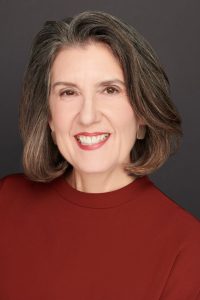 Elizabeth Morton, Educator and Consultant
Elizabeth Morton, Educator and Consultant
Dr. Elizabeth Morton is a D.C.-based planning educator and consultant, specializing in urban design, historic preservation and placemaking. She has a special interest in documenting the cultural heritage of underrepresented groups and promoting and supporting longstanding independent businesses.
Dr. Morton taught graduate planning courses at Virginia Tech’s National Capital Region campus for 15 years and currently leads studios in GW’s Sustainable Urban Planning master’s program.
She has worked for a variety of arts and preservation organizations, and as a consultant has conducted studies for institutions such as the World Bank, UNESCO, the Metropolitan Institute, the Indian National Trust for Art and Cultural Heritage (INTACH), Urban Arts, and the John F. Kennedy School of Government. Most recently, she was the Evaluation Consultant for the Beyond Granite initiative led by the Trust for the National Mall in partnership with the National Capital Planning Commission and National Park Service; Beyond Granite seeks to elevate underrepresented stories in Washington DC’s commemorative landscape.
Dr. Morton has a long track record of community service and leadership. She has been appointed to the Arlington County (VA) Planning Commission, the Arlington Public Art Committee, the McLean Revitalization Corporation, and numerous other advisory bodies. She has also recently served as an Expert Panel Member for the National Science Foundation (2022) and the Transportation Research Board (2018-2022).
Dr. Morton earned a Ph.D. (City Design & Development) from MIT, an MCRP (Housing & Real Estate) from UNC-Chapel Hill, and a B.A. (Art History and English) from Williams College.
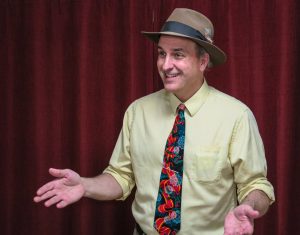 Stephen "Woody" LaBounty, Executive Director, San Francisco Heritage.
Stephen "Woody" LaBounty, Executive Director, San Francisco Heritage.
Woody LaBounty leads nonprofit initiatives in San Francisco and is a researcher, writer, and speaker on the city's history. He serves as President and CEO of San Francisco Heritage, a 50-year-old nonprofit with a mission to protect and enhance San Francisco's unique architectural and cultural identity.
Before joining Heritage, Woody was the longtime executive director of the local history organization, Western Neighborhoods Project. There he led efforts to save relief cottages from the 1906 San Francisco earthquake, bring more than 50,000 historical images online, and use arts and history to equitably enrich neighborhoods.
He does a lot of research and writing on San Francisco history—articles, context statements, and three books to date—and enjoys the challenges of project-based partnerships between diverse community groups, historians, and government agencies.
Woody produces a weekly email newsletter on San Francisco history. Sign up for it at SanFranciscoStory.com. Photo of Woody by Dennis Minnick
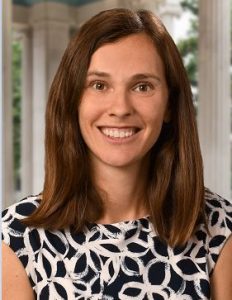 Rachel Lyons, City & County of Denver.
Rachel Lyons, City & County of Denver.
Rachel has worked for Denver Economic Development & Opportunity for the past 6 years. She transformed the vision of a legacy business program into a reality for the City of Denver. The program has successfully scaled-up from it's pilot phase and is continuing to evolve. Rachel also has experience with tax credit incentives and small business grant programs. She facilitates strong cross-sector collaborations that create opportunity and prosperity in underserved communities. Prior to joining the City of Denver, Rachel worked for 10 years in the local non-profit sector.
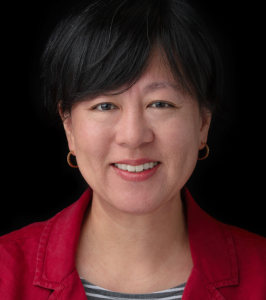 Rosalind Sagara, Los Angeles Conservancy.
Rosalind Sagara, Los Angeles Conservancy.
M. Rosalind Sagara is the Neighborhood Outreach Manager at the Conservancy and as a public historian and community organizer, she is passionate about bringing people and resources together to preserve historic places. She serves on the Boards of the Save Our Chinatown Committee and Asian & Pacific Islander Americans in Historic Preservation. Rosalind holds an M.A. in Heritage Conservation from the University of Southern California, M.A. in Film Studies from the University of Iowa, and B.A. in English from UC Riverside.
Contact: rsagara@laconservancy.org
